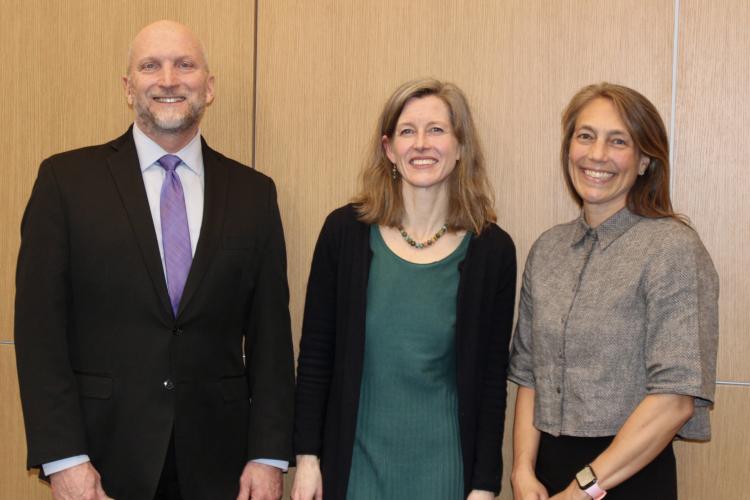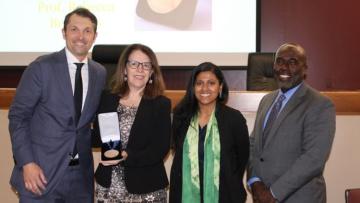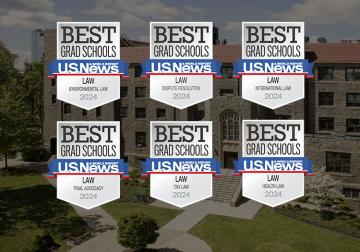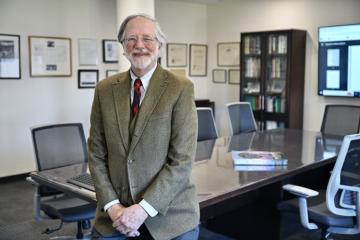Elisabeth Haub School of Law Convenes Climate Constitutionalism Conference with Karenna Gore as Keynote Speaker

The Elisabeth Haub School of Law at Pace University hosted a Climate Constitutionalism Conference on Pace University’s New York City Campus on Friday, March 29, 2024. The timely conference brought together constitutional law experts, climate change activists, environmental law professors, and noteworthy legal professionals from around the country to examine the crucial role of federal and state constitutions in responding to the climate crisis.
Organized by Haub Law Distinguished Professor of Environmental Law Katrina F. Kuh and Delaware Law School Distinguished Professor of Law James R. May, the Climate Constitutionalism conference was inspired by the recently released book, Democracy in a Hotter Time edited by David W. Orr, to which they were both contributing chapter co-authors.
The conference’s morning panels focused on State Constitutions and Climate Change and The U.S. Constitution and Climate Change. Panelists joined invited discussants and attendees for robust roundtable discussions over lunch. And an afternoon panel centered on Litigating Constitutional Climate Claims. The event culminated with a Public Town Hall featuring keynote speaker Karenna Gore, founder and executive director of the Center for Earth Ethics and visiting professor of practice of earth ethics at Union Theological Seminary in New York. Student reporters from Haub Law, CUNY Law, and Delaware Law kicked off the town hall by presenting the findings of the earlier roundtable discussions. The student reporters are preparing blog posts summarizing the roundtable discussions which will be posted on the Greenlaw Blog.
“Understanding the obstacles and opportunities that constitutions present to the development of effective climate policy is crucial as we orient our democracy to respond to the climate crisis ” said Professor Katrina Kuh. “We were honored to welcome scholars, practitioners, and judges to examine these issues and to have Karenna Gore as our keynote speaker, prompting vital conversations on our constitutions, democracy, and climate change.“
Keynote speaker Karenna Gore founded the Center for Earth Ethics in 2015 to address the moral and spiritual dimensions of the climate crisis. Working at the intersection of faith, ethics, and ecology, she guides the Center’s public programs, educational initiatives, and movement-building. She is also the author of Lighting the Way: Nine Women Who Changed Modern America.
During her discussion, which was moderated by Professors Kuh and May, Gore praised their contributions made to Democracy in a Hotter Time, and stressed the importance of such scholarly work and public forums like the Climate Constitutionalism Conference.
“We are at a point right now where the intelligence of the human species is in serious question. Are we able to solve this, are we smart enough? And if the answer to that is yes, we have to figure out a way to acknowledge nature. We will need to figure out a way to acknowledge that we depend for survival on the air, water, and biosystem for the atmosphere and that has to be in our foundational documents in some way or another,” said Gore. “Ethics undergirds our laws and social norms in society and as a field it is most powerful in those times when both laws and social norms are out of step with a deeply felt sense of right and wrong. When the sensibility of ethics is widely shared and deeply felt, that is when laws and social norms can be changed.”
The conference was made possible by generous funding from the JPB Fund and Rockefeller Brothers Fund. Panelists included: Quinn Yeargain, Assistant Professor of Law, Widener University, Commonwealth Law School; Rebecca Bratspies, Professor and Director/Founder of CUER, CUNY School of Law; Amber Polk, Assistant Professor of Law, Florida International University College of Law; Michael Wilson, Hawaii Supreme Court (retired); Erin Ryan, Clyde W. Atkinson Professor and Associate Dean for Environmental Program, Florida State University College of Law; Bill Funk, Distinguished Professor of Law Emeritus, Lewis & Clark Law School; Amanda Shanor, Assistant Professor of Legal Studies & Business Ethics Wolpow Family Faculty Scholar, The Wharton School, David Driesen, University Professor at the College of Law, Syracuse University; Phil Gregory, founder of Our Children’s Trust, Esq.; David Bookbinder, Esq.; Maria Antonia Tigre, Director of Global Climate Change Litigation, Sabin Center for Climate Change Law, Columbia University, Matt Pawa, Partner, Seeger Weiss, LLP; Paul Rink, Assistant Professor, Elisabeth Haub School of Law at Pace University.
About Elisabeth Haub School of Law at Pace University
Pace University’s Elisabeth Haub School of Law offers JD and Masters of Law degrees in both Environmental and International Law, as well as a Doctor of Juridical Science (SJD) in Environmental Law. The school, housed on the University’s campus in White Plains, NY, opened its doors in 1976 and has more than 10,000 alumni around the world. The school maintains a unique philosophy and approach to legal education that strikes an important balance between practice and theory. Haub Law launched its Environmental Law Program in 1978, and it has long been ranked among the world’s leading university programs, with a current #1 ranking by U.S. News & World Report.



